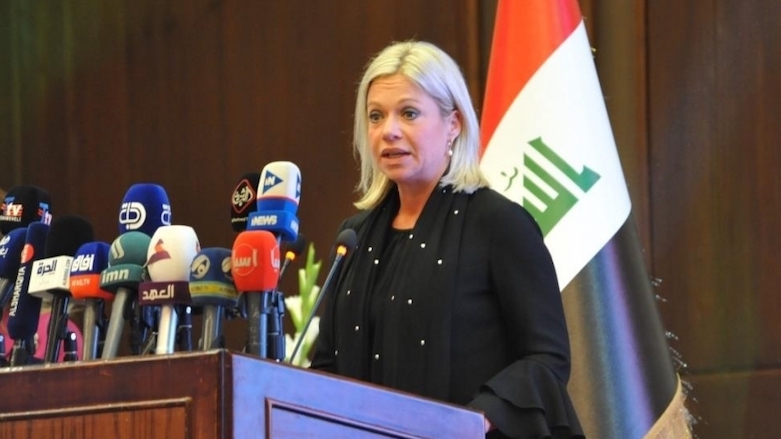UN envoy to Iraq calls for Sinjar agreement to be implemented
At a meeting in Mosul on Thursday, the head of the United Nations Assistance Mission for Iraq (UNAMI), Jeanine Hennis-Plasschaert, urged Iraqi and the Kurdistan Regional Government (KRG) to implement a recent agreement for administering and providing security for the disputed district of Sinjar (Shingal).

ERBIL (Kurdistan 24) – At a meeting in Mosul on Thursday, the head of the United Nations Assistance Mission for Iraq (UNAMI), Jeanine Hennis-Plasschaert, urged Iraqi and the Kurdistan Regional Government (KRG) to implement a recent agreement for administering and providing security for the disputed district of Sinjar (Shingal).
Hennis-Plasschaert, accompanied by UN Deputy Special Representative and Resident Coordinator for Iraq Irena Sollorano met with Nineveh Governor Najm al-Jabouri and locals from Shingal to discuss the matter.
During a press conference following the meeting, she urged acceleration of “the process of rebuilding, improving services, and returning the displaced to their homes.
“They discussed the implementation of the Sinjar Agreement in order to create stability and security in the area and allow for its reconstruction as well as the return of the internally displaced persons (IDPs),” UNAMI said in a tweet.
Hennis-Plasschaert said, “The most important thing is stability, security structures and unified management,” adding that although agreements are not always complete, she asked parties in both Baghdad and Erbil “accelerate steps to implement the agreement on the ground.”
Iraq and the KRG announced on they had reached an agreement, with support of the UN, to restore and normalize the situation in Shingal, where competing armed groups are active. The plan involves understandings on security, civil administration, reconstruction, service rehabilitation, and the return of those displaced when the Islamic State took over the area in 2014.
Read More: KRG and Baghdad reach administrative, security agreement on Sinjar
The UN envoy continued, “When the federal and Kurdish regional government recently (and finally) agreed on a number of principles and steps to overcome these discords and disputes…I was hopeful. Hopeful because this could pave the way for a new chapter for Sinjar, for all Sinjaris. A chapter in which the interests of the Sinjari people will come first.”
“But for all of that to happen, stable governance and stable security structures are urgently needed. It is (in a way) the basis for any form of progress. And this is exactly what is being acknowledged in what is being called the government-to-government agreement.”
She concluded, “And true, signing off on such agreement is just a very first step. Sound implementation will prove essential.”
Notably, the agreement includes understandings to withdraw all armed groups from the area, restore the local administration, and appoint a new mayor.
Almost five years have passed since November 2015, when the Islamic State was pushed from the area. Since late 2017, however, the area has been under the control of Iraqi forces and Iranian-backed militias of the Popular Mobilization Forces (PMF). In addition, the Shingal Resistance Units (YBS), the local wing of the Kurdistan Workers’ Party (PKK), is active in the area and receives salaries from the PMF.
Much of the city remains uninhabitable rubble, and very few of its former residents have returned to their homes.
Baghdad appointed new officials in Shingal in place of the elected officials who had withdrawn from the area to relocate to the Kurdistan Region’s Duhok province, where they still conduct district business.
There are, thus, currently two local governments: one appointed by Baghdad and the other elected before October 2017 by the people of the area.
Before the Islamic State overran Shingal in August 2014, it was region was home to some 200,000 residents, most of them members of the Yezidi (Ezidi) religious minority. The terrorist group proceeded to kidnap and massacre untold numbers of people, and thousands of women and girls were forced into sexual slavery. Those atrocities are now widely recognized as genocide.
Tens of thousands of Yezidis from Sinjar and surrounding areas remain displaced in the Kurdistan Region. Others fled to Europe and other areas abroad.
Thousands are still missing. According to a report of France 24 between June and September this year, at least 34,000 IDPs returned to Sinjar, predominantly Ezidis.
Editing by John J. Catherine